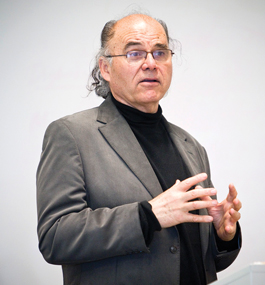Settling Scores

Photo by Tom Kates
Kanan Makiya, the Sylvia K. Hassenfeld Professor of Islamic and Middle Eastern Studies, teaches and studies modern Arab politics with a particular focus on the regime of the Ba’ath party in Iraq.
The desire to settle accounts, which is bound to arise in the immediate aftermath of a successful revolution, is on the whole a negative and destabilizing force that must be managed, since it cannot be avoided. The Iraqi experience after the fall of Saddam Hussein in 2003 shows that a new democracy’s future turns on tempering accountability with forgiveness. That did not happen in Iraq, and a civil war ensued.
Countries like Egypt and Libya still face a difficult dilemma. No dictatorship can endure decades without deriving some degree of authority or legitimacy from large numbers of people, many of them employed in the agencies of repression. And these numbers have grown astronomically in virtually all Arab states in the last 30 years. These people are, to one degree or another, responsible for the abuses of the past, even if only indirectly.
But you cannot hold accountable everyone who was responsible for the wrongs of the past. To do so would surely tear society apart at the very moment when it must come together to remove a dictator. Just imagine the bedlam that would ensue in Syria if that path were pursued in the wake of Bashar al-Assad’s successful overthrow. Yet, for the sake of the many victims of a toppled regime, you must hold somebody to account for past crimes. The victims, too, are entitled to feel that the new order has acknowledged and taken responsibility for what happened to them.
The art of politics is walking the fine line between accountability and forgiveness in the aftermath of a successful transition from dictatorship. Arab countries undergoing revolutionary change should follow the example of postapartheid South Africa, where truth commissions were set up to help society acknowledge past abuses (and sometimes provide compensation for those injustices) rather than simply meting out more punishment. Through its cultural and civic institutions, a fledgling democracy can sort out how people should be judged for past wrongs. Egypt is just beginning to face these questions. But we have yet to see a serious debate over them.
